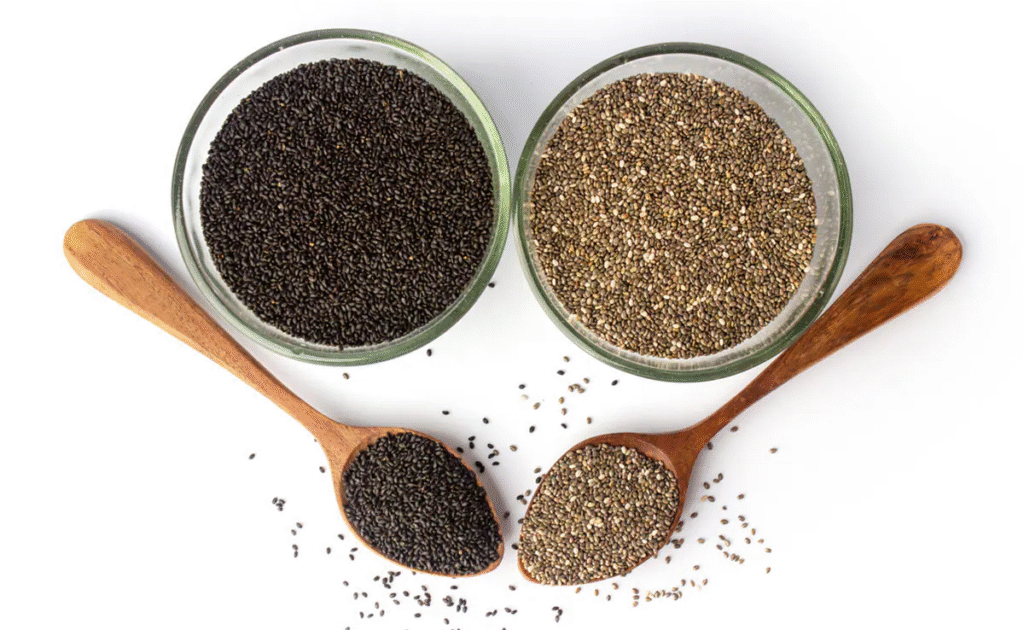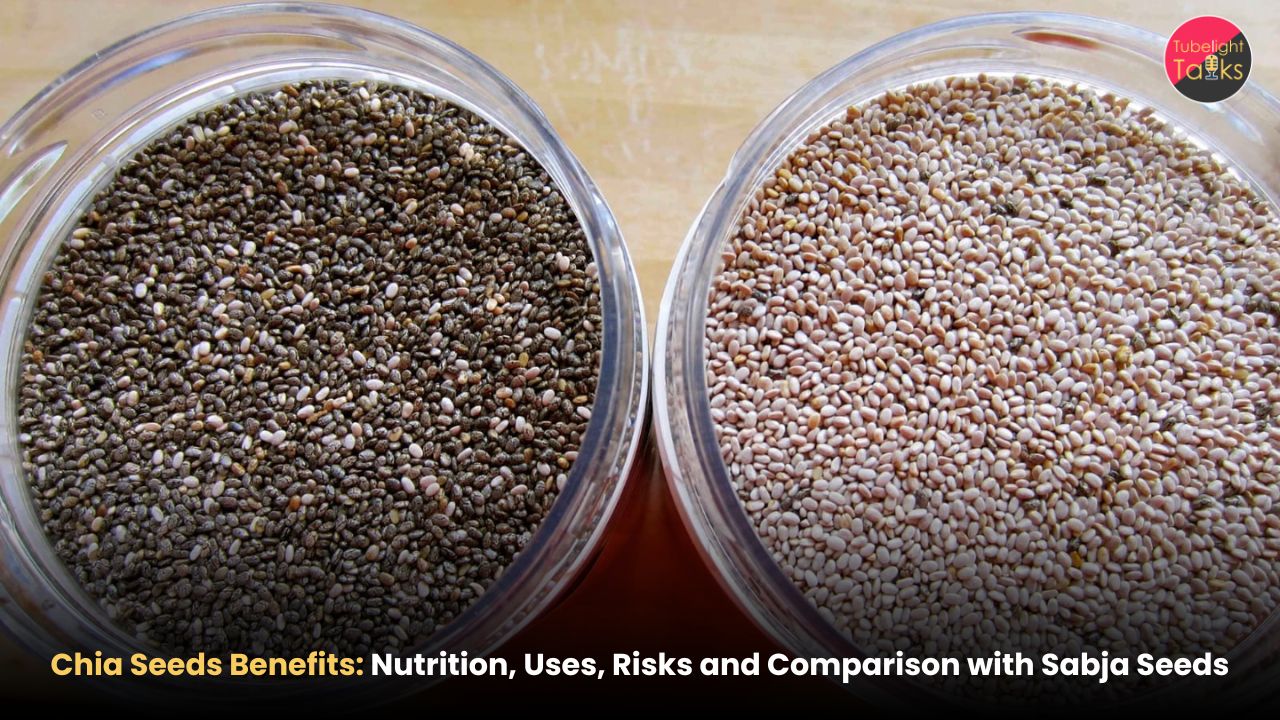Chia Seeds Benefits: Nutrition, Uses, Risks and Comparison with Sabja Seeds
Chia seeds have emerged as one of the most popular superfoods in recent years, thanks to their impressive nutrient profile and versatility in cooking. Originating from the Salvia hispanica These tiny black or white seeds were prized by the ancient Aztecs and Mayans for energy and endurance. However, like any food, proper preparation is essential to avoid risks. Learn more about the advantages and disadvantages of chia seeds in this article.
What are Chia Seeds?
Chia seeds are tiny edible seeds obtained from the Salvia hispanica plant (scientific name), a species belonging to the mint family and native to Central America, particularly Mexico and Guatemala.
Despite their small size, these seeds are nutritional powerhouses with exceptional water-absorbing properties. When soaked, they can expand to nearly twelve times their original weight, forming a gel-like texture. Chia seeds are today highly sought-after for their versatility and health benefits.
Types of Chia Seeds
There are three types of chia seeds.
- Black Chia Seeds: Though black and white chia seeds are essentially the same the prime difference is in their colour. Black chia seeds are mottled in their appearance, and black in colour. They are more abundantly available as compared to the white variant, and thus, cheaper.
- White Chia Seeds: White colour in chia seeds is a direct result of the presence of a recessive gene, producing off-white or ivory-coloured chia seeds. They are more expensive compared to black chia seeds as they are not as abundant as the black variant.
- Brown Chia Seeds: There is also a third variant in chia seeds – the brown one. These are not used as they are the immature seeds. They also lack the typical nutritional profile of chia seeds due to their failure to mature under unfavourable weather conditions.
Chia Seeds vs Sabja Seeds

Chia seeds are often compared with sabja seeds, also known as basil or tukmaria seeds.
- Chia seeds come from the Salvia hispanica plant, while sabja seeds are derived from sweet basil (Ocimum basilicum).
- Both form a gel when soaked, but sabja seeds expand faster and are commonly used in Indian drinks like falooda for their cooling properties.
- Are chia seeds better than sabja? Nutritionally, chia seeds have more omega-3 fatty acids and fibre, benefiting heart and digestive health. Sabja seeds, on the other hand, are rich in iron and have natural cooling and detoxifying effects. Including both seeds in your diet can offer complementary health benefits.

Nutritional Profile of Chia Seeds
Despite their small size, chia seeds are packed with essential nutrients. A standard serving of two tablespoons (28 grams) contains:
- Fibre: 9-10 grams approximately, supporting digestion and gut health.
- Protein: 4-5 grams approximately, aiding muscle repair and promoting satiety.
- Healthy fats: 5 grams of plant-based omega-3 fatty acids (ALA), beneficial for heart and brain health.
- Minerals: High in calcium, magnesium, phosphorus and manganese for bone strength and energy metabolism.
- Antioxidants: Help combat oxidative stress and inflammation.
Chia seeds are suitable for plant-based, vegan, vegetarian and gluten-free diets as a rich antioxidant food, making them an easy addition to various meal plans.
Top Health Benefits of Chia Seeds
Among the varied benefits of chia seeds, the most notable are:
Improves Digestive Health
Chia seeds are rich in fibre, which helps maintain regular bowel movements. When soaked, they absorb liquid and form a gel. This supports hydration and a smoother digestion.
Supports Heart Health
Omega-3 fatty acids in chia seeds may reduce cholesterol, improve circulation and lower cardiovascular risk. Regular consumption can also support healthy blood pressure levels.
Aids in Weight Management
The combination of protein and fibre in chia seeds promotes fullness and slows digestion, helping control appetite. Including chia seeds in meals can support weight management when paired with a balanced diet. Health experts emphasise the use of chia seeds when on a weight loss journey and a high-fibre diet. The protein content in them also makes them a plant-based protein option.
Strengthens Bones and Teeth
Chia seeds also provide some calcium, magnesium and phosphorus.
Regulates Blood Sugar Levels
Soluble fibre in chia seeds slows carbohydrate absorption, preventing rapid spikes in blood sugar and supporting steady energy levels throughout the day.
Also Read: How AI Is Transforming Healthcare in India: A Revolution
Boosts Energy and Endurance
Historically used by warriors for stamina, chia seeds provide slow-release carbohydrates, protein and healthy fats. This also makes them an excellent option for pre-workout energy.
How to Include Chia Seeds in Your Diet
Chia seeds are easy to add to daily meals. They are used in multiple ways such as:
- Blend into smoothies or protein shakes.
- Mix into yoghurt, porridge or cereal.
- Make chia seed pudding by soaking them in milk or plant-based alternatives.
- Use as an egg substitute in vegan baking (1 tbsp chia + 3 tbsp water).
- Sprinkle on salads, soups or homemade energy bars.
However, the most dangerous way to consume chia seeds is without soaking them. Due to their hydrophilic nature, they absorb water quickly and swell up. Not soaking them leads to the dry seeds absorbing water from within the human body and turning into a blob of gel like seeds. This is extremely dangerous as it can cause obstruction in food passages. Therefore, chia seeds need to be soaked for at least 30 minutes before consumption.
Risks and Side Effects of Chia Seeds
While chia seeds are safe for most people, certain precautions are necessary:
- Digestive discomfort: Consuming large amounts without soaking may cause bloating or constipation.
- Choking risk: Dry chia seeds can expand in the digestive tract and form a gel-like mass, potentially causing blockages. In one reported case, a man had severe difficulty swallowing after eating dry chia seeds, requiring medical intervention to remove the obstruction. Always soak chia seeds for at least 30 minutes before consumption.
- Allergies: Rare, particularly in individuals sensitive to mint-family plants.
- Medication contradictions: Chia seeds may slightly lower blood pressure and thin the blood, so consult a doctor if on related medications.
Are Chia Seeds Healthy?
Chia seeds offer numerous benefits. They improve digestion, support heart and bone health, regulate blood sugar, and also help manage weight. The rich nutritional profile of chia seeds includes fibre, protein, omega-3s and essential minerals. This makes chia seeds a superfood. However, proper preparation is a must. Soaking chia seeds ensures safe consumption and maximises their health benefits.
Real Nourishment for the Body and Soul
Chia seeds and other healthy foods nourish the body, but true fulfilment comes from feeding the soul. Sant Rampal Ji Maharaj explains that physical food alone cannot lead to salvation. The soul thrives on true worship guided by a Tatvdarshi Sant. Through their satsang, one learns the real purpose of life and attains lasting peace. While eating well strengthens the body, only divine knowledge and devotion provide the ultimate nourishment for the soul.
Learn more about the way to nourish your soul and reach complete salvation on www.jagatgururampalji.org
FAQs About Chia Seeds
Q1. How many chia seeds should I eat daily?
Answer: A typical serving is 1-2 tablespoons (10–28 grams) per day.
Q2. Can chia seeds help with weight loss?
Answer: Yes, they can due to their high fibre and protein content.
Q3. Are chia seeds better than sabja seeds?
Answer: Chia seeds are richer in omega-3s and fibre, while sabja seeds are better for cooling and iron intake. Both have unique health benefits.
Q4. Can I eat chia seeds dry?
Answer: No, always soak chia seeds before consuming to prevent digestive blockages.
Q5. Are chia seeds safe for everyone?
Answer: Most people can safely consume chia seeds, but those with swallowing difficulties, digestive disorders or on blood-thinning medications should consult a healthcare professional.











Discussion (0)